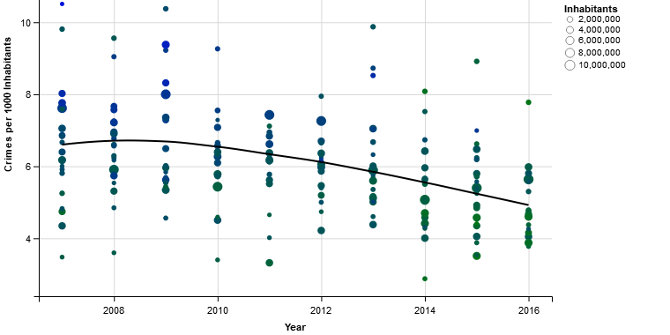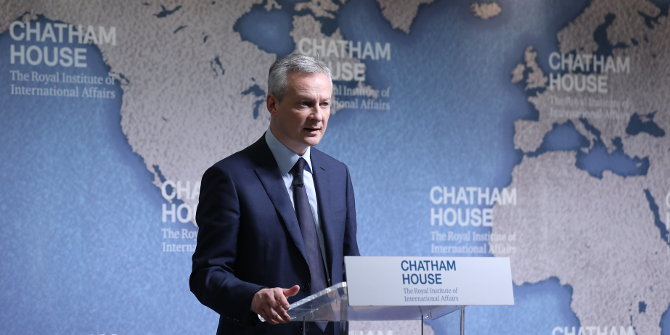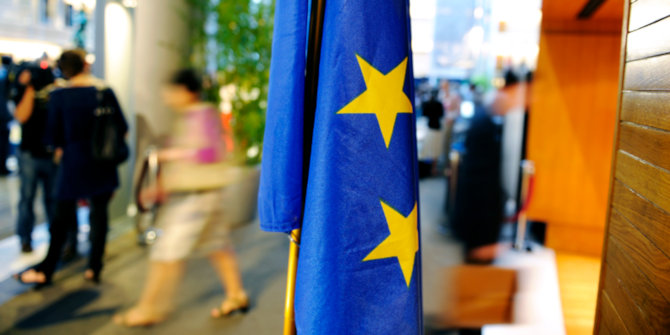 Alexandre Holroyd is the En Marche! candidate representing the French living in Northern Europe. In a recent panel discussion organised by the 1989 Generation Initiative, he discussed the implications of Macron’s presidency for Brexit, the future of the European Union and the importance of the upcoming elections in France for the next five years.
Alexandre Holroyd is the En Marche! candidate representing the French living in Northern Europe. In a recent panel discussion organised by the 1989 Generation Initiative, he discussed the implications of Macron’s presidency for Brexit, the future of the European Union and the importance of the upcoming elections in France for the next five years.
 Alexandre Holroyd (left), Michael Cottakis (centre) and Professor Iain Begg (right) at the talk ‘What does Macron’s presidency mean for Brexit?‘ (LSE, 26 May 2017)
Alexandre Holroyd (left), Michael Cottakis (centre) and Professor Iain Begg (right) at the talk ‘What does Macron’s presidency mean for Brexit?‘ (LSE, 26 May 2017)
What is Macron’s position on the European Union?
The decision of En Marche! to run an openly pro-European campaign puzzled most political commentators. At a major meeting on 10 December in Paris, Macron dedicated a third of his speech to the European project, something that had not occurred in France since the late 90s.
The party truly believes that the future of France and its economic prosperity lies in Europe. This Europhile position is both an emotional one linked to the memory of the war and the role the EU played in building peace, and a pragmatic one linked to the single market and the economic opportunities it offers. This position has traditionally been defended by the UK with France being on the other side of the table.
Finally, this position is realistic, the election of Donald Trump has accelerated the perception that the US is withdrawing slowly from Europe, combined with difficult relations with Russia, there is a need to federate both European defence efforts and security intelligence capacities.
What are the implications of a Macron presidency for Brexit?
In the first six to eight months, there will be little open criticism of the European Commission’s conduct of the negotiations. Indeed, enormous efforts are being made to show a complete alignment of all the European positions behind the chief negotiator, Michel Barnier. This is a fundamental element of what Brexit is going to look like from a French perspective.
The British press coverage of Macron’s position on Brexit, reporting that he wants to punish the UK by making it less competitive is wrong. However, the reality is a strong desire to make France more competitive and attractive and I do not believe that this has to be done at the expense of the UK.
As for the Brexit negotiations, very few people in France do believe that it will be settled within the allocated two years. The complexity of EU decision-making, which includes twenty-six regulatory bodies who sift through secondary legislation on all sorts of policy issues and the UK will be subject to these for the foreseeable future, for at least eight to ten years.
It is unlikely that by the two years timeframe, the UK and the EU will have a full exit deal. However, I think that the highly political issues (i.e citizen’s rights, budget) will be solved during that period and then a long transitional period is likely to be established to negotiate the different regulatory mechanisms.
Macron’s Presidency will not have an enormous impact on Brexit per se, but rather on the future of the European Union. While there was a narrative in the UK that the EU will fall apart and that right-wing candidates are going to sweep across the continent, there is instead a drive at the moment to push Europe forward following the elections in Austria, the Netherlands and France. But that is going to be an enormous challenge because, in the last twenty years, there has been a growing anxiety on what direction the European project is taking.
To address that, Macron has developed a measure in his programme called a ‘democratic convention’ that will be launched by the end of 2017 in all the Member States. The objective is to grasp what the citizens expect from the EU taking into account the coherence in different countries. It is similar to the way the En Marche programme was developed by crowdsourcing information from hundreds of local committees across the country, which was followed by experts working with the results to translate them into concrete policy proposals.
This is how the party ranked its key priorities: employment, education and the European Union. The idea is to replicate this methodology at the European level, working with academics and experts, to end up with a clear idea of where the EU project should go and potentially a treaty reform based on the results of the democratic convention. The key objective is to defend an EU that can advance without unanimity, with different levels of integration than those that already exist in some policy areas such as the Eurozone.
What if Macron can’t get an absolute majority in the upcoming elections?
There are three possible scenarios. First, if Macron wins an absolute majority in the elections, he will be able to implement his set of reforms in France. If En Marche doesn’t get an absolute majority, but a cross-party coalition is possible where the left and the right get some of their reforms through, this means that Macron will be able to implement only a smaller part of the programme.
Finally, although the polls don’t seem to be going in that direction, there is a possibility where even a cross-party coalition is impossible. If this happens it will be a disaster for France and for Europe and very little will be done over the next five years. The President is very powerful if he has the Parliament on his side. There is indeed a threat of anti-European candidates gaining support if the presidency results in high unemployment and increased inequality. On the European elements of the programme – including the relaunch of the EU and the Foreign policy plans – the only way to get the Germans on board is to prove that Macron can reform the country, but if he fails then nothing will be implemented at the EU level.
It is essential that French citizens go to the polls and vote in the upcoming elections because the parliamentary election is as important as the presidential election.
A recording of the full event is available here.
Please read our comments policy before commenting.
Note: This article gives the views of the interviewee, and not the position of EUROPP – European Politics and Policy, nor of the London School of Economics.
_________________________________
 Alexandre Holroyd
Alexandre Holroyd
Alexandre Holroyd is the En Marche! candidate representing the French living in Northern Europe. He studied European politics at the London School of Economics (LSE) and worked for five years in Brussels in the consultancy industry before going back to London.






I would like to add as comments my personal view what the EU should do for it’s citizens.
Note I am Dutch from birth, a UK-expat of 30 years and have made full use of my EU freedom of movement by working in several EU countries.
Protectionism
——————–
In my world view there is nothing wrong with a bit of EU protectionism if it protects our rights as citizens, consumers or workers. Some argue EU market entry rules are to the detriment of developing countries. Especially Africa is often mentioned in between #brexit, #frexit or #nexit crocodile tears. I have a deep mistrust of the real motivation driving those arguments. The same people often lament the fact that EU rules stop protectionism at a National level. It is well documented that the British representatives in the EU council of Ministers were the most vocal in counteracting Chinese steel dumping practices as a good example. It’s just the fact that we in EU practice this kind of sensible protectionism at a EU level, rather than a national level, that these Nationalist can’t get their head around.
The same people that shout we should give poor African Farmers a chance, are the same people that shout loudest we must do more to buy ‘British’ or ‘French’. The main reason for a common agricultural policy has to be food security at an EU level. f we have seasonal shortages in our common market we should use our common EU purchasing power in a responsible way. Not buy up food stuff in Africa while locals go hungry by being priced out of local markets. The principle of the EU-Africa partnership deals is the right way to make our purchasing power a force for change for the good on that continent. But it has to be monitored by ethical committees so it does not end up like modern slavery.
Free Movement of people
————————————-
To illustrate my thinking here I would like to recall a program shown recently on UK TV called “brexit wife swap” IN it a fervent British white nationalist man takes his pro-EU partner for the week into an ethnic diverse community in East London. The camera zooms in on stall holders of Indian, Pakistani and Bangladeshi origin and then on the white man complaining he feels a stranger in his ‘own’ country.
Wait a minute, is my reaction, aren’t these all immigrants from your favourite ‘Commonwealth’? What on Earth does that have to do with EU free movement or brexit? Yes, continues the man’s feeble argument, they all get here via Europe’s borderless Schengen agreement. It’s complete bullshit of course, but that’s how uneducated minds work. They see brown faces in Calais camps. Next they see brown faces on a london market. Hence they must be the same people. It’s racism pure and simple. The government does not own up to the fact that most of these people fly in by passenger jet from the Asian sun-continent. Nothing to do with EU or Calais refugees.
In conclusion the EU and member states have failed educating their people on the difference between EU protectionism (largely benign) and globalism ( experienced as a threat).
The EU is always the easy scapegoat for weak national politicians and dubious tabloids playing on the fear of people.
What better way to present an unpopular local policy initiative as something that is handed down by faceless bureaucrats in Brussels?
The only way to counteract this is by increasing the democratic mandate of the EU parliament and by holding representatives to the EU council of ministers more to account what they conspire in Brussels by asking them to justify this in National parliaments
Increase the democratic mandate etc. of the EU political machine, says Marcus. Will there be a referendum country by country on this, and will these referendums be advisory or just be the usual EU carrot and stick approach with taxpayers’ funds paying for the massive campaign and all the people living on the EU purse being bought on board?
Sorry a few typos crept in. Improved text here
https://identityspace.wordpress.com/2017/06/16/the-implications-of-macrons-presidency-for-brexit/